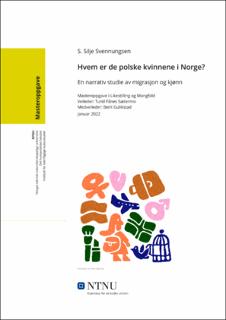| dc.description.abstract | Abstract
In this master thesis I investigate the narratives of Polish women regarding their
migration experiences before and after moving to Norway, as well as their experiences,
both personally and regarding other individuals. The main objective of the thesis is to
examine the composition of the female Polish population in Norway, with an emphasis on
gender and intersectionality. The thesis is based on empirical data gathered from six indepth
interviews that I conducted with Polish women who decided to migrate to Norway.
The empirical data from the interviews is presented through four chapters of analysis.
The analysis method used is thematic narrative analysis.
In the first chapter of analysis, I analyze the women's self-representation as Polish
female migrants. My findings are that love, adventure, and family - not an existing Polish
husband, but parents - are the main motivators for migrating, despite the fact
that female motivations for migrating must be seen as complex. Here, I also discuss the
message in the narratives for motivations, and I find female agency to be an important
trait throughout. My research questions in this chapter are: 1. What are the motivations
for migrating? 2. How do the women talk about themselves as migrants? And 3. Who are
the narratives constructed for?
In the second chapter of analysis, I examine what the women see as their opponent
against their narratives of self-representation. I examine the content and the message of
the narratives which are presented as the categories: ‘The Good Modern Pole’ and ‘The
Bad Traditional Pole’. Intersectionality was a useful analysis technique in exploring the
women's constructed categories, as well as in discovering what the women disclose when
distancing themselves from the category ‘The Bad Traditional Pole’. Here, my research
questions are: 1. Is there an opponent in the narratives? 2. Who is the opponent,
according to the women? And 3. What can the stories about the opponents tell us about
the women themselves?
In the third chapter of analysis, I examine narratives of migration as emancipation, and if
migration is leading the Polish female migrants closer to western feminism. My findings
are that the women in this study experience freedom in different ways, but that
motivations of freedom are not usually linked with motivations in the decision to
migrate.
In the fourth and final chapter of analysis, I explore narratives of belonging and
loneliness. Despite the fact that Statistisk Sentralbyrå describes the Polish population
residing in Norway as feeling relatively little loneliness, I point out that belonging doesn’t
always revolve around living together with your husband, and that more research has to
be done on ‘all the single ladies’ who have different migration motivations other than
family. | |
